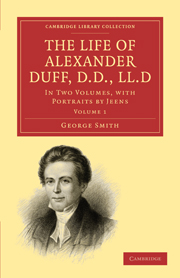Book contents
- Frontmatter
- Contents
- CHAPTER I THE BOY AND THE STUDENT
- CHAPTER II THE FIRST MISSIONARY OF THE CHURCH OF SCOTLAND
- CHAPTER III THE TWO SHIPWRECKS
- CHAPTER IV CALCUTTA AS IT WAS
- CHAPTER V THE MINE PREPARED
- CHAPTER VI THE FIRST EXPLOSION AND THE FOUR CONVERTS
- CHAPTER VII THE RENAISSANCE IN INDIA — THE ENGLISH LANGUAGE AND THE CHURCH
- CHAPTER VIII THE RENAISSANCE IN INDIA—SCIENCE AND LETTERS
- CHAPTER IX WORK FOR EUROPEANS, EURASIANS AND NATIVE CHRISTIANS
- CHAPTER X THE INVALID AND THE ORATOR
- CHAPTER XI DR. DUFF ORGANIZING
- CHAPTER XII FISHERS OF MEN
- CHAPTER XIII EGYPT—SINAI—BOMBAY—MADRAS
- CHAPTER XIV FIGHTING THE GOVERNOR-GENERAL
- CHAPTER XV THE COLLEGE AND ITS SPIRITUAL FRUIT
CHAPTER XIV - FIGHTING THE GOVERNOR-GENERAL
Published online by Cambridge University Press: 05 July 2011
- Frontmatter
- Contents
- CHAPTER I THE BOY AND THE STUDENT
- CHAPTER II THE FIRST MISSIONARY OF THE CHURCH OF SCOTLAND
- CHAPTER III THE TWO SHIPWRECKS
- CHAPTER IV CALCUTTA AS IT WAS
- CHAPTER V THE MINE PREPARED
- CHAPTER VI THE FIRST EXPLOSION AND THE FOUR CONVERTS
- CHAPTER VII THE RENAISSANCE IN INDIA — THE ENGLISH LANGUAGE AND THE CHURCH
- CHAPTER VIII THE RENAISSANCE IN INDIA—SCIENCE AND LETTERS
- CHAPTER IX WORK FOR EUROPEANS, EURASIANS AND NATIVE CHRISTIANS
- CHAPTER X THE INVALID AND THE ORATOR
- CHAPTER XI DR. DUFF ORGANIZING
- CHAPTER XII FISHERS OF MEN
- CHAPTER XIII EGYPT—SINAI—BOMBAY—MADRAS
- CHAPTER XIV FIGHTING THE GOVERNOR-GENERAL
- CHAPTER XV THE COLLEGE AND ITS SPIRITUAL FRUIT
Summary
Lord Auckland had been Governor-General for four years when, for the second time, Dr. Duff landed at Calcutta. Apart from contemporary history, his appointment to the most responsible office under the British Crown forms the most scandalous instance of the sacrifice of the good of the people of India and of the peace of the Empire to the intrigues and the selfseeking of political parties. India is so far outside of, so high above, the level of purely party politics, that it used to be true that its governing and commercial classes left Whig and Tory prejudices behind them. Even the purely British officials who, as Governor-General, governors, and law member of council, owed their appointments to partisan considerations among others, were generally raised by the very elevation of their duties to the disinterested and philosophic level which looked only at the good of India. From the high vantage ground of a Governor-General's seat, the purely domestic questions which cause the rise and fall of ministers in England often look petty indeed. It may be accepted as an absolute test which marks off the really able statesmen among the nineteen Governor-Generals from the few whom history despises, that the former in every case acknowledged first their duty to India; the latter, their selfish gratitude to the party which sent them out. Against rulers like Warren Hastings, Lords Wellesley and Hastings, W. Bentinck and Dalhousie, Canning and Mayo, we have to set Cornwallis (the second time), Amherst and Auckland, not to mention the living.
- Type
- Chapter
- Information
- The Life of Alexander Duff, D.D., LL.DIn Two Volumes, with Portraits by Jeens, pp. 425 - 441Publisher: Cambridge University PressPrint publication year: 2010

